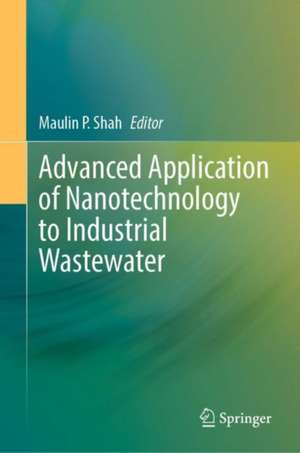Advanced Application of Nanotechnology to Industrial Wastewater
Editat de Maulin P. Shahen Limba Engleză Hardback – 25 iun 2023
The book describes a broad area of nanotechnology and water research where membrane processes (nanofiltration, ultrafiltration, reverse osmosis and nanoreactive membranes) are considered key components of advanced water purification and desalination technologies that remove, reduce or neutralize water contaminants. Various nanoparticles and nanomaterials that could be used in water remediation (zeolites, carbon nanotubes, self-assembled monolayers on mesoporous supports, biopolymers, single-enzyme nanoparticles, zero-valent iron nanoparticles, bimetallic iron nanoparticles and nanoscale semiconductor photocatalysts) are also discussed.
This book is beneficial for students and academicians to understand the recent research advancements in the field.
Preț: 1009.61 lei
Preț vechi: 1231.23 lei
-18% Nou
Puncte Express: 1514
Preț estimativ în valută:
193.25€ • 209.98$ • 162.43£
193.25€ • 209.98$ • 162.43£
Carte tipărită la comandă
Livrare economică 21 aprilie-05 mai
Preluare comenzi: 021 569.72.76
Specificații
ISBN-13: 9789819932917
ISBN-10: 9819932912
Pagini: 363
Ilustrații: VI, 363 p. 57 illus., 46 illus. in color.
Dimensiuni: 155 x 235 mm
Greutate: 0.72 kg
Ediția:2023
Editura: Springer Nature Singapore
Colecția Springer
Locul publicării:Singapore, Singapore
ISBN-10: 9819932912
Pagini: 363
Ilustrații: VI, 363 p. 57 illus., 46 illus. in color.
Dimensiuni: 155 x 235 mm
Greutate: 0.72 kg
Ediția:2023
Editura: Springer Nature Singapore
Colecția Springer
Locul publicării:Singapore, Singapore
Cuprins
Nano-biotechnology based solution to the age old problem of spentwash causing water pollution in the vicinity of distilleries.- Application of nanomaterials in heavy metals remediation from wastewater.- Application of metallic nanoparticles for industrial wastewater treatment.
Notă biografică
Dr. Maulin P. Shah is interested in genetic adaptation processes in bacteria. He has more than 120 research publications in highly distinguished national and international journals. He directs the research program at Enviro Technology Ltd., Ankleshwar, India. He has guided more than 100 post-graduate students in various disciplines of life science. He is an active editorial board member of more than 150 renowned journals in the field of environmental and biological sciences. He was the founder and editor-in-chief of the International Journal of Environmental Bioremediation and Biodegradation (2012–2014) and the Journal of Applied & Environmental Microbiology (2012–2014) [Science and Education publishing (SciEP), USA]. He is also serving as a reviewer for various journals of national and international repute. Recently, he has been awarded a Young Biotechnologist Medal by the Biotechnological Society of Nepal. He has edited 25 books in the area of wastewater microbiology and industrial wastewater treatment as well as over 50 books in the area of water and wastewater treatment.
Textul de pe ultima copertă
This book discusses new and innovative trends and techniques in the application of nanotechnology to industrial wastewater treatment both at a laboratory scale and an industry scale, including treatment, remediation, sensing and pollution prevention. The book also explores unique physicochemical and surface properties of nanoparticles; it highlights advantages they provide for engineering applications. Each chapter covers a different nanotechnology-based approach and examines basic principles, practical applications, recent breakthroughs and associated limitations. Nanotechnology applications to wastewater research have significant impact in maintaining the long-term quality, availability and viability of water. Regardless of the origin—for example, municipal or industrial wastewater—the remediation nanotechnology allows water to be recycled and desalinized in addition to simultaneously detecting biological and chemical contamination.
The book describes a broad area of nanotechnology and water research where membrane processes (nanofiltration, ultrafiltration, reverse osmosis and nanoreactive membranes) are considered key components of advanced water purification and desalination technologies that remove, reduce or neutralize water contaminants. Various nanoparticles and nanomaterials that could be used in water remediation (zeolites, carbon nanotubes, self-assembled monolayers on mesoporous supports, biopolymers, single-enzyme nanoparticles, zero-valent iron nanoparticles, bimetallic iron nanoparticles and nanoscale semiconductor photocatalysts) are also discussed.
This book is beneficial for students and academicians to understand the recent research advancements in the field.
The book describes a broad area of nanotechnology and water research where membrane processes (nanofiltration, ultrafiltration, reverse osmosis and nanoreactive membranes) are considered key components of advanced water purification and desalination technologies that remove, reduce or neutralize water contaminants. Various nanoparticles and nanomaterials that could be used in water remediation (zeolites, carbon nanotubes, self-assembled monolayers on mesoporous supports, biopolymers, single-enzyme nanoparticles, zero-valent iron nanoparticles, bimetallic iron nanoparticles and nanoscale semiconductor photocatalysts) are also discussed.
This book is beneficial for students and academicians to understand the recent research advancements in the field.
Caracteristici
Provides a wide variety of information on state-of-the-art nanotechnology application to wastewater treatment Summarizes how technology can play a key role in achieving a more productive and sustainable environment Explores different aspects of nanotechnology for basic and advanced environmental biotechnological applications
